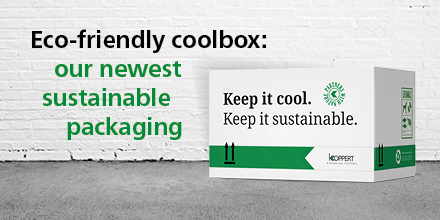
Koppert will be introducing a 100% recyclable cool box for transporting biological solutions by early May 2021. This initiative is in line with the company’s sustainability target of ‘Zero Waste by 2030’. The new sustainable box will be used to transport beneficial insects and microorganisms to combat horticultural and agricultural pests worldwide. This eco-friendly cool box is specifically designed for long-haul transportation to ensure fresh, quality products at the destination.
The Eco-friendly cool box has been designed and adapted for the transportation of live insects and mircoorganisms. The first cool boxes will be shipped from Koppert headquarters to subsidiaries, and eventually to Koppert customers at a later stage.
‘The new box is made from only bio-based and renewable materials and is 100% recyclable.
It is made purely out of recycled cardboard and paper. Although the polystyrene used in the former design can be fully recycled, in practice there are few recycling plants that do this worldwide, while paper and cardboard waste streams are widely available. That is why Koppert has now opted for this packaging material.
Changes and benefits
• Easier to recycle in terms of waste streams worldwide
• Renewable raw materials
• Improved ‘breathability’ for insects
• Better moisture regulation (less condensation/better absorption and evaporation)
• Space saving for storage (easy to flatten and stack)
• Less volume to recycle
• Dimensions optimized for cargo space in air transportation
The Eco-friendly cooler is developed in line with the United Nations Social Sustainability Goals with regard to waste and pollution reduction. ‘Our ultimate goal is to contribute to a healthy environment by reducing internal and external waste down to 0% while using 100% sustainable materials for our products and packaging by 2030,’ says Koppert’s Packaging and Raw Materials Sustainability Focus Group Lead, Edwin Muijt.